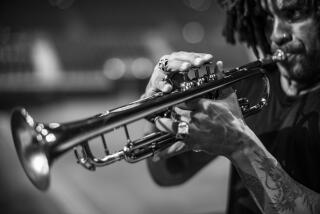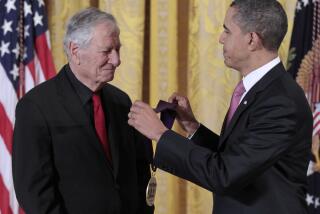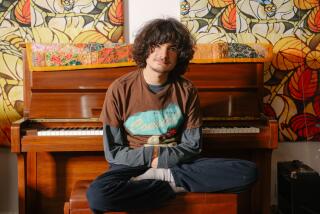‘A Joyful Survivor’ : Despite Health Problems, Jacob Blitzstein Persevered to Earn His Diploma
- Share via
Jesus Ibarra was confused by the elderly man in the skull cap.
He was obviously much older than other students at Central Adult High School. And he was an Anglo on a campus where most students are Latinos, blacks and Asian-Americans.
“I asked myself what he was doing here. I thought he was a volunteer,” says Ibarra, 21, of Los Angeles.
“The first time I talked to him I asked a question in English and he answered in Spanish. I thought he was white and Jewish. . . . I never imagined that he would speak Spanish.”
Jacob Blitzstein surprised his fellow students all the time. He isn’t some stuffy guy, despite his trim gray beard and conservative clothes.
Blitzstein is warm and gregarious. He likes to hear a good joke--and loves to tell a good story. He is tough, tenaciously so--especially when it comes to pursuing his dream.
Last weekend, that dream came true. At a ceremony attended by two of his children and three grandchildren, Blitzstein, 81, graduated from high school.
After Principal Lanny Nelms handed him the diploma and announced his age, Blitzstein waved to the audience and cried.
And why not? He’s probably the oldest Central High graduate since the school opened in 1974. Although no records of such things are kept, a Los Angeles district spokesman says Blitzstein is the oldest graduate he’s ever heard of.
Earning his diploma took 10 years, during which the retired store owner suffered a stroke and two bouts of pneumonia, had two pacemakers installed and lost his wife and two siblings.
He kept to his task for a reason. School “is the best medicine you can have,” he says. “You have something on your mind--a goal.”
Although he completed high school and some Jewish studies in his native Ukraine in the 1920s, Blitzstein says, “I had in my mind all the time that I still want to study.”
“When you live in the nation like the U.S., which is the best you experience in your life, you want to know the history. I read the newspapers, but it’s not enough.
“So I went to high school with the idea it doesn’t matter what happens, I have to get my diploma. I don’t know if I’m going to be sick or die.”
Blitzstein didn’t die; he flourished under the demands for grades and papers. In his class of 89, he was one of two students who earned perfect 4.0 averages.
Blitzstein started his studies at Culver City Adult School in 1981 but switched to Central in 1989 because it was a shorter drive.
Although determined to get his degree, he sometimes has wavered under the burden of repeated illnesses.
“After my stroke I had to re-register,” he says. “My hand was shaking so badly I couldn’t sign. I figured this was the time I had to get out.
“The counselor took my hand. She said, ‘Jacob, it’s nothing. Don’t worry. I’ll sign for you.’ ”
While recovering from one bout of pneumonia, he says, he felt too weak to get out of bed. “I told my daughter school is gone for me. I’m not going to drive anymore.
“She said to me, nonchalant, ‘Well it will be the first dropout in the family.’ (His three children are college graduates.)
“I’m serious, and she’s making a joke out of it. I said maybe it’s not so bad. Because she’s been talking to the doctor. She knows the truth.”
At the graduation ceremony, he was so excited that, while shaking hands with dignitaries onstage, he didn’t realize fellow students were giving him a standing ovation. “My son told me later,” he says.
Onstage, he did have the presence of mind to ask what time it was. The school had tried to start the ceremony promptly at 6:30 p.m. so Blitzstein could return home by sundown to observe the Jewish Sabbath.
Blitzstein left right after the ceremony but not before about 10 students had asked to have their pictures taken with him.
“It was inspiring to students to see this old gentleman struggle,” says Michelle de la Rosa, his English teacher. “Revising is the way we teach here. He’d write for me. I’d say, ‘One more time. Try again. Make it better.’
“Sometimes he would start to lecture the students. He would tell them, ‘Just because you tried (and failed), you can’t give up.’ He would unbutton his shirt. He wants everybody to touch his pacemaker. He’s proud of his pacemaker. He’s a joyful survivor.”
“I feel proud to have him around,” Ibarra says. “He’s tried so hard to get this degree. I dropped out of Roosevelt High when I was 18. I wasted three years thinking I was too old for that (school). When I saw him, my mind changed.
“People always told me everything in life is possible. It’s never too late. I never took them serious,” says Ibarra, who wants to attend college and become a police officer. “When I saw him, I said, ‘I guess it’s true.’ ”
“I told the students that Jacob teaches us that intelligence helps, but it isn’t intelligence that guarantees success,” de la Rosa says. “The man is a living example of tenacity and stamina.”
“When he told his life story (in class), they were mesmerized. He has a real wisdom and beauty of expression.”
That story began in the Ukraine in 1911, where he was born the third of six children. Blitzstein left at 17 because of his family’s poverty and what he called persecution of Jews by Polish authorities. He joined a brother operating a general store at a Venezuelan oil field.
They later paid for two sisters’ passage, but when Blitzstein asked his mother to migrate in the 1930s, she refused to leave the burial place of his father, who died in 1926. One brother and one sister stayed with her.
During World War II, German soldiers surrounded his family’s synagogue, made them dig their graves and shot them to death, a cousin told Blitzstein.
“In the middle of (talking about his life), many times he’d stop because he had to cry,” de la Rosa says. “Many times his memories are very present to him.”
After the war, Blitzstein went to Baltimore to visit a cousin and met his future wife. They lived in Venezuela for three years before moving to Baltimore in 1950 and to Los Angeles in 1963.
Jean Blitzstein died of cancer in 1987. Within three years, Jacob also lost a brother and sister in Baltimore.
To help ease his grief and to overcome his own health woes, Blitzstein threw himself into volunteer work at Cedars-Sinai Medical Center, where he received a pacemaker 10 years ago. He has averaged two days a week as an interpreter in Russian, Yiddish and Spanish.
“I had moments (during illnesses) when I did not want to go out from bed,” Blitzstein says. “That this is the end. But if you feel that you can do something for somebody, you go out. I would advise anybody sick to go see people laying in bed who cannot eat or dress by themselves. And you can go places and drive a car, and you’re sick?”
Blitzstein’s son, Robert, could sense his father’s determination when he called his parents’ home early some mornings to ask how his father was feeling.
“Mother would say, ‘Dad’s in a chair and doesn’t feel so hot,” says Robert, 41, an accountant. “And I’d go to the office and call back and say how’s he feeling now? She’d say, ‘OK, he went to Cedars.’ He’d say, ‘I can sit here and kvetch all day, but there’s plenty of people I can interpret for there.’
“I’d say to him, ‘You’re not on the payroll. You can take a day off now and then.’ He’d say, ‘One day I might not be able to do this. Every day God gives me, I want to take advantage of.’ Many days he’d walk four miles during the day at Cedars and come home and be unable to walk to the dinner table.”
With his diploma in hand, Blitzstein maintains he’s not through yet.
“You know something? I’m going to college,” he told a visitor recently. He has checked out West Los Angeles and Santa Monica community colleges and says he hopes to transfer from there to a four-year school.
“It’s not a joke,” he says. “If I live to the year 2000, maybe I’ll be a doctor.”
More to Read
Sign up for Essential California
The most important California stories and recommendations in your inbox every morning.
You may occasionally receive promotional content from the Los Angeles Times.













